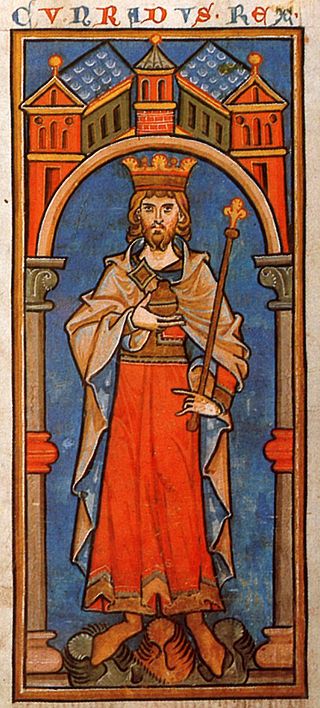Franconia is a historical region of southern Germany.
Contents
Franconia may also refer to:
Franconia is a historical region of southern Germany.
Franconia may also refer to:

The Salian dynasty or Salic dynasty was a dynasty in the High Middle Ages. The dynasty provided four kings of Germany (1024–1125), all of whom went on to be crowned Holy Roman emperors (1027–1125).

Conrad III of the Hohenstaufen dynasty was from 1116 to 1120 Duke of Franconia, from 1127 to 1135 anti-king of his predecessor Lothair III, and from 1138 until his death in 1152 King of the Romans in the Holy Roman Empire. He was the son of Duke Frederick I of Swabia and Agnes, a daughter of the Salian Emperor Henry IV.
Brunswick is the historical English name for the German city of Braunschweig.

The Duchy of Saxony was originally the area settled by the Saxons in the late Early Middle Ages, when they were subdued by Charlemagne during the Saxon Wars from 772 and incorporated into the Carolingian Empire (Francia) by 804. Upon the 843 Treaty of Verdun, Saxony was one of the five German stem duchies of East Francia; Duke Henry the Fowler was elected German king in 919.

An ocean liner is a type of passenger ship primarily used for transportation across seas or oceans. Ocean liners may also carry cargo or mail, and may sometimes be used for other purposes. Only one ocean liner remains in service today.
Girard may refer to:
Hamburg, officially the Free and Hanseatic City of Hamburg, is Germany's second-largest city and a federated state.

The Blue Line is a rapid transit line of the Washington Metro system, consisting of 28 stations in Fairfax County, Alexandria and Arlington, Virginia; Washington, D.C.; and Prince George's County, Maryland, United States. The Blue Line runs from Franconia–Springfield to Downtown Largo. The line shares track with the Orange Line for 13 stations, the Silver Line for 18, and the Yellow Line for 7. Only 3 stations are exclusive to the Blue Line.

Lincoln is a town on Lake Ontario in the Niagara Region, Ontario, Canada. The town's administrative and commercial centre is in the community of Beamsville.
Eberhard III, a member of the Conradine dynasty, was Duke of Franconia, succeeding his elder brother, King Conrad I, in December 918. From 926 to 928, he also acted as ruler of Lotharingia.

The Kingdom of Germany or German Kingdom was the mostly Germanic-speaking East Frankish kingdom, which was formed by the Treaty of Verdun in 843, especially after the kingship passed from Frankish kings to the Saxon Ottonian dynasty in 919. The king was elected, initially by the rulers of the stem duchies, who generally chose one of their own. After 962, when Otto I was crowned emperor, East Francia formed the bulk of the Holy Roman Empire, which also included the Kingdom of Italy and, after 1032, the Kingdom of Burgundy.

The Duchy of Swabia was one of the five stem duchies of the medieval German Kingdom. It arose in the 10th century in the southwestern area that had been settled by Alemanni tribes in Late Antiquity.

The Duchy of Franconia was one of the five stem duchies of East Francia and the medieval Kingdom of Germany emerging in the early 10th century. The word Franconia, first used in a Latin charter of 1053, was applied like the words Francia, France, and Franken, to a portion of the land occupied by the Franks.
The Conradines or Conradiner were a dynasty of Franconian counts and dukes in the 8th to 11th Century, named after Duke Conrad the Elder and his son King Conrad I of Germany.

RMS Ivernia was a Saxonia class ocean liner, built in 1955 by John Brown & Company in Clydebank, Scotland for Cunard Line, for their transatlantic passenger service between the UK and Canada. In 1963 she was rebuilt as a cruise ship and renamed RMS Franconia, after the famous pre-war liner RMS Franconia. She continued to sail for Cunard until being withdrawn from service and laid up in 1971. In 1973 she was sold to the Soviet Union's Far Eastern Shipping Company and, renamed SS Fedor Shalyapin, cruised around Australia and the far East. In 1980 she was transferred to the Black Sea Shipping Company fleet, and for a time returned to cruising in the Mediterranean and around Europe. In 1989 she was transferred again, to the Odessa Cruise Company, and continued her career as a cruise ship until 1994. She was then laid up at Illichivsk, a Black Sea port 40 km southwest of Odesa, until 2004 when, as the Salona, she sailed to Alang, India, where she was scrapped.
RMS Aurania was an ocean liner owned by the Cunard Line. She was built in 1916 at Wallsend and measured 13,936 gross register tons.

The RMS Franconia was an ocean liner operated by the Cunard Line from 1922 to 1956. The liner was second of three liners named Franconia which served the Cunard Line, the others being RMS Franconia built in 1910 and the third Franconia in 1963.

Sir James Gordon Partridge Bisset, CBE, RD was a British merchant sea captain who served as Commodore of the Cunard White Star Line (1944–47). He documented his fifty-year sea career in a three volume autobiography: Sail Ho! My Early Years at Sea (1958); Tramps and Ladies – My Early Years in Steamers (1959) and Commodore – War, Peace and Big Ships (1961). In addition, Bisset authored Lifeboat Efficiency (1924) which became the primary text used by the British Merchant Marine until the Second World War for instructing merchant seaman in lifeboat utilization and handling, and Ship Ahoy ! : Nautical Notes for Ocean Travellers (c.1930), a treatise on shipboard operations for the edification of passengers. He served in or commanded Cunard liners including Carpathia, Caronia, Franconia, Mauretania, Aquitania, Berengaria, Queen Mary and Queen Elizabeth.
Heinrich Funck was a mill operator, religious author and a Mennonite bishop in America.

The Rhoad's Meetinghouse, formerly the home of the Vincent Mennonite Church, is located in East Vincent Township, Chester County, Pennsylvania. The historic church building now houses a law firm.